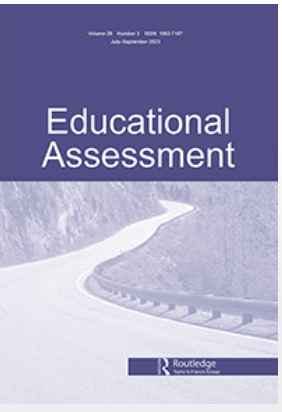Publication examines “Fairness in Educational Assessment and the Next Edition of the Standards.” October 6 event at UCLA will explore “Fairness” as researchers consider revision of testing Standards
In the coming months, professional organizations in the educational measurement community will be working to develop the next edition of the Standards for Educational and Psychological Testing, the professional benchmarks and code that guide the development and evaluation of testing practice. One key issue to be considered is fairness in testing and assessment.
A recent special issue of the research journal Educational Assessment, “Fairness in Educational Assessment and the Next Edition of the Standards,” co-edited by UCLA’s Joan Herman, Alison Bailey, and Jose Felipe Martinez, seeks to encourage reflection and discussion around the different assumptions and conceptualizations of fairness in assessment and their implications for the next edition of the Standards. The publication aims to address persistent concerns over issues of racial injustice and educational equity.

“In the wake of the pandemic and amid racial and social tensions, there is a public questioning of standardized assessment, what it is and how fairly are we assessing students. The three of us put our heads together and said, “This would be a perfect opportunity to have a special issue around the question of fairness and assessment,” says UCLA professor Alison Bailey.
“This special issue takes that core question about how we are going to update and infuse the notion of fairness with everything that’s going on. We are hoping to try to get out in front of that conversation, to plant some ideas, raise some concerns and challenges, and make sure they are at the forefront of people’s minds as the new edition of the Standards gets put together,” Bailey adds.
The special issue includes articles by Jennifer Randall, Professor of Psychometrics and Test Development at the University of Michigan, Randy E. Bennett, the Norman O. Frederiksen Chair in Assessment Innovation at the Educational Testing Service, and Guillermo Solano-Flores, Professor of Education at Stanford University.
In “It Ain’t Near ‘Bout Fair: Re-envisioning the Bias and Sensitivity Review Process from a Justice-oriented Antiracist Perspective,” Randall argues for a proactive justice-oriented assessment development process that re-envisions the purpose and outcomes of bias and sensitivity reviews to make them actively anti-racist.
In his article, “Toward a Theory of Socio-culturally Responsive Assessment,” Bennett advises that testing as an enterprise must rethink its practices and better respond to today’s calls for equity, to address the growing perception that current testing perpetuates social injustice. The article lays out preliminary theoretical guidelines and design principles for enacting socio-culturally responsive assessment.
In “How Serious Are We about Fairness in Testing and How Far Are We Willing to Go? A Response to Randall and Bennett with Reflections about the Standards for Educational and Psychological Testing,” Solano-Flores examines challenges faced in moving from principles and recommendations to systemic and meaningful change in assessment practice. Acknowledging the contributions of testing to inequity and social reproduction, he underscores the influence of students’ opportunity to learn in current achievement gaps. Solano-Flores offers a historical perspective on efforts to address test fairness, procedures, and guidelines developed by testing agencies and professional bodies. He cautions that it is easier to look socially responsible than to actually achieve test fairness. Principles, propositions, and recommendations are not a guarantee of change.
A final commentary by the three editors highlights the key conceptual, methodological, and practical challenges raised by the three core articles and their implications for the Standards, and for research and innovation needed to produce high-quality tests that are fair, inclusive, and educationally useful.
The three articles agree on raising possibilities for evolving definitions of fairness, and for holding higher expectations for test developers and users relative to fairness and inclusiveness throughout test design, development, and validation. The editors underscore the importance of intently focusing on these ideas in the coming revision of the Standards for Educational and Psychological Testing.
The special issue has encouraged conversations among the measurement community including the three sponsoring organizations, the American Educational Research Association (AERA), the American Psychological Association (APA), and the National Council for Measurement in Education (NCME). These organizations are working to expand the exchange of ideas and information and offering opportunities to learn more and provide feedback on the revision of the Standards.
The special issue of Educational Assessment, “Fairness in Educational Assessment and the Next Edition of the Standards,” is co-edited by Joan L. Herman, Alison L. Bailey, and Jose Felipe Martinez. The issue can be found online at https://doi.org/10.1080/10627197.2023.2215979
A one-day conference at the UCLA James West Alumni Center on October 6 will bring together members of the management committee overseeing the next edition of the Standards with the editors and authors of the special issue and other prominent researchers and practitioners, including AERA president and UCLA Education professor Tyrone Howard, NCME past president Ye Tong, and Policy Analysis for California Education executive director Heather Hough among others. The event will engage researchers and practitioners in reflection and discussion around conceptual, technical, and policy issues relevant to the advancement of fairness in the next edition of the AERA/APA/NCME Standards. The conference is co-sponsored by the UCLA Department of Education, UCLA CRESST, and Policy Analysis for California Education (PACE). Additional information, including a full list of program participants, can be found at https://seis.ucla.edu/calendar/re-envisioning-fairness-in-educational-assessment